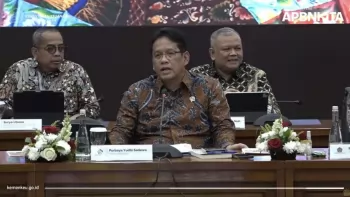
News Update
Purbaya Gives Ministries 16-Day Deadline to Finalize Budget
/index.php
Berita Terkini - Posted on 04 August 2024 Reading time 5 minutes

DIGIVESTASI - The Constitutional Court (MK) has ruled that age and gender limits for workers do not inherently lead to discrimination in the workplace. Consequently, the MK has rejected the application for Case Number 35/PUU-XXII/2024, which challenged the constitutionality of Article 35, paragraph (1) of Law Number 13 of 2003 on Employment.
The petitioner argued that this article allows for discrimination because employers can choose workers based on criteria such as age, gender, or ethnicity, which are deemed irrelevant and discriminatory.
"The verdict: adjudicating, we reject the Petitioner's application in its entirety," said Chief Justice Suhartoyo on Friday (2/8/2024).
Constitutional Justice Arief Hidayat explained that human rights are considered discriminatory if there are distinctions based on religion, ethnicity, race, ethnic group, social class, economic status, gender, language, and political beliefs. This limitation on discrimination does not pertain to age, work experience, or educational background.
"Therefore, according to the Court, this is not related to discrimination in employment," stated Arief.
However, the Court emphasized that the placement of workers must be regulated with consideration of basic rights and labor protection, as well as the needs of the business environment conducive to development. Worker placement should be based on principles of openness, freedom, objectivity, fairness, and equality without discrimination.
Additionally, workers should be placed in positions that match their expertise, skills, talents, interests, and abilities, while respecting their dignity, human rights, and legal protection. Therefore, requirements such as age limits, work experience, and educational background are not considered discriminatory.
"The regulation regarding the prohibition of discrimination for workers is stated in Article 5 of Law 13/2003," added Arief. Dissenting Opinion of Constitutional Justice M Guntur Hamzah
Constitutional Justice Guntur Hamzah argued that the Court should have partially granted the Petitioner's application. He believed that while the article under review may not have constitutional issues, it could be abused and requires clarification from the perspective of justice.
Guntur pointed out that the norm in Article 35, paragraph (1) of Law 13/2003 could create legal uncertainty because the phrase "recruiting the necessary workers themselves" is very subjective and could be misused by employers.
"I believe that the requirement of a certain age in job vacancies could hinder competent individuals who are limited by age. Such restrictions contradict the principle of providing opportunities and eliminating limitations in a rational, fair, and accountable manner," explained Guntur.
Previously, the petitioner, Leonardo Olefins Hamonangan from Bekasi, argued that Article 35, paragraph (1) of the Employment Law limits access and opportunities for workers. This norm also creates legal uncertainty and conflict between employers and workers or regulators.
The petitioner compared job requirement discrimination regulations in other countries such as the United States, Germany, and the Netherlands, which have clearer rules regarding age limits, work experience, and other factors.
"In Germany, the maximum age limit in job vacancies must be objective and reasonable. If not, citizens can file a civil lawsuit. Unfortunately, in Indonesia, there are no specific regulations to protect citizens from discrimination in job requirements," said the petitioner.
Find more news and articles on Google News
Source: okezone.com
What do you think about this topic? Tell us what you think. Don't forget to follow Digivestasi's Instagram, TikTok, Youtube accounts to keep you updated with the latest information about economics, finance, digital technology and digital asset investment.
DISCLAIMER
All information contained on our website is summarized from reliable sources and published in good faith and for the purpose of providing general information only. Any action taken by readers on information from this site is their own responsibility.